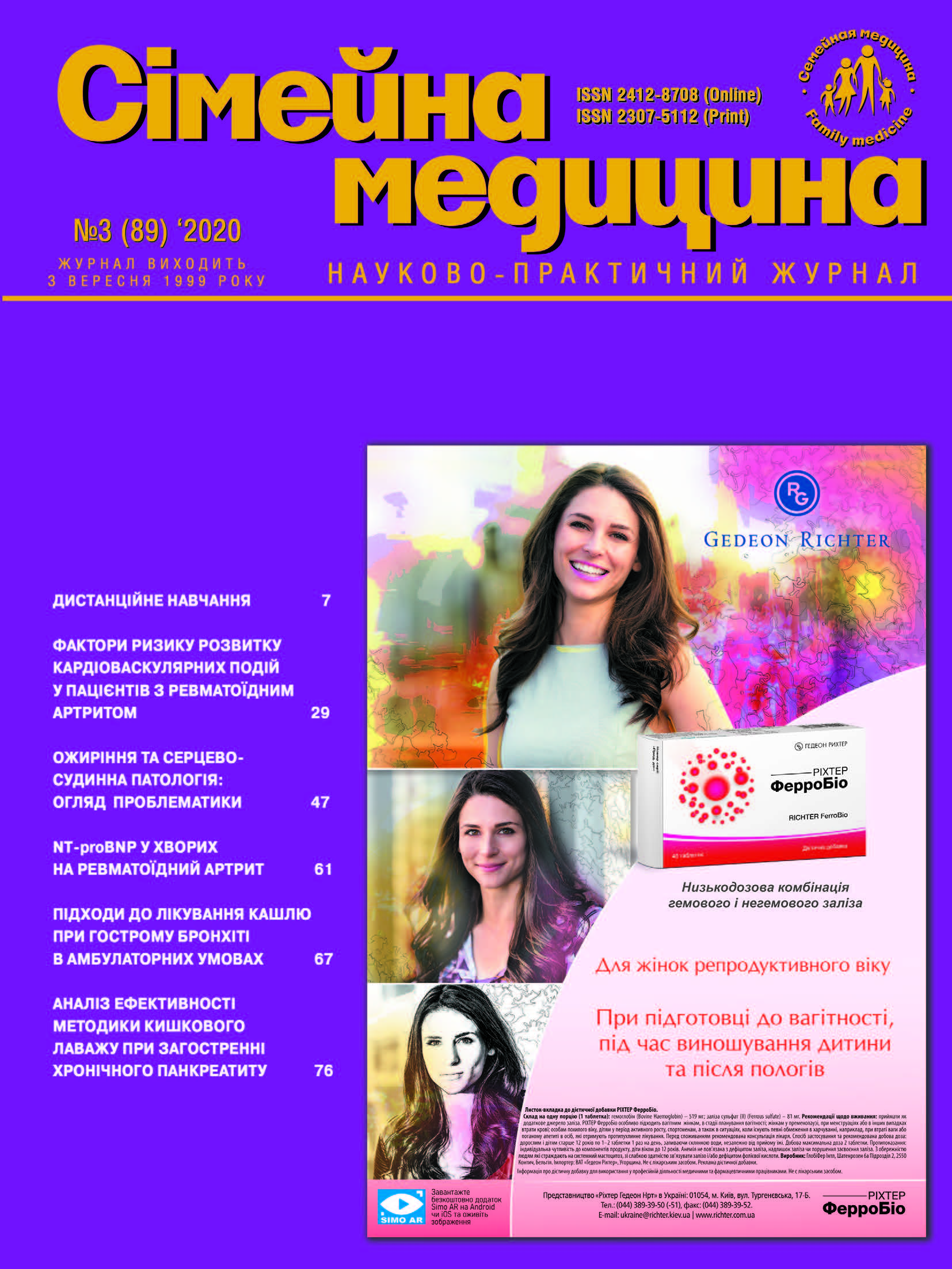The Analysis of Intestinal Lavage Method Efficiency in Patients with Chronic Pancreatitis Exacerbation
##plugins.themes.bootstrap3.article.main##
Abstract
The clinical picture in patients with chronic pancreatitis (CP) which develops due to acute pancreatitis (AP) (in month after attack of AP) is characterized by intestinal insufficiency syndrome (IIS). The multifactorial mechanism of IIS in CP as a result of AP requires direct attention of the physician on the elimination of the pathological symptoms, which are the main cause of malabsorption, trophological insufficiency, abdominal discomfort and pain, and as consequence, reduced quality of life and social adaptation.
The objective: to investigate the dynamic of the clinical signs, anthropometric parameters and pro- and antioxidant status indicators after treatment by proposed treatment with the intestinal lavage course in patients with chronic pancreatitis which is as result of acute pancreatitis.
Materials and methods. The results of investigation and outpatient treatment of 34 patients with CP (complicated by IIS) as a result of AP were analyzed.
Results. It was established the effectiveness of the optimized treatment complex at the level of MA – 39,55 %, CM254 – 8,85 %, CM280 – 7,09 %, SOD – 7,75 %, SH-groups – 5,18 %, catalase – 17,78 %. The effectiveness of the optimized treatment complex by the level of PSA was 41,15 %, ferritin – 18,61 %, albumin – 15,13 %. The implementation of the proposed treatment course in the standart treatment of patients with chronic pancreatitis which developed due to acute pancreatitis has led to a significant more effective reduction of pain, improved coprogram results and normalization of endogenous intoxication indicators and positive changes antioxidant system.
Conclusion. The conducted analysis of results showed that the parameters of C-reactive protein, albumin and ferritin can be used as markers of the intoxication expresion, severity of inflammation and nutrient deficiency, as well as determining the number of intestinal lavage procedures: when the content of CRP 3,0–7,0 mg/l, ferritin – 100,0–150,0 ng/ml, albumin – 35,0–32,0 g/l one lavage procedure was performed; with content of CRP – 7,0–30,0 mg/l, ferritin – 50,0–100,0 ng/ml, albumin – 32,0–29,0 g/l – 3 procedures were perfomed, with a CRP content of 30,0–50,0 mg/l, ferritin – 20,0–50,0 ng/ml, albumin ≤29,0 g/l 5 procedures of intestinal lavage were performed.##plugins.themes.bootstrap3.article.details##

This work is licensed under a Creative Commons Attribution 4.0 International License.
Authors retain the copyright and grant the journal the first publication of original scientific articles under the Creative Commons Attribution 4.0 International License, which allows others to distribute work with acknowledgment of authorship and first publication in this journal.
References
Babinets L.S., Melnyc N.A., Shevchenko N.O. Optimization of the complex therapy of chronic pancreatitis with metabolic syndrome / [Babinets L.S., Melnyc N.A., Shevchenko N.O. at all.] // Likarski Widomosti. 2018 /tom LXXI, № 2, cz. 1. – P. 337–340.
Bellin MD, Whitcomb DC, Abberbock J, et al. Patient and disease characteristics associated with the presence of diabetes mellitus in adults with chronic pancreatitis in the United States. Am J Gastroenterol 2017;112(9):1457–65.
Clinical pancreatology for practicing gastroenterologists and surgeons / Ed. J.E. Dominguez-Munoz. – Oxford et al.: A Blackwell Publ. Co., 2005. – 535 р.
Conwell D.L. et al. American Pancreatic Association Practice Guidelines in Chronic Pancreatitis: evidence-based report on diagnostic guidelines // Pancreas. – 2014. – Т. 43. – № 8. – С. 1143.
Johnson C.D. et al. Qualitative assessment of the symptoms and impact of pancreatic exocrine insufficiency (PEI) to inform the development of a patientreported outcome (PRO) instrument // The Patient-Patient-Centered Outcomes Research. – 2017. – Т. 10. – № 5. – С. 615–628.
Pezzilli R. Pain in chronic pancreatitis: from the bench to the bedside. JOP. 2012;13:245–6.
Whitcomb DC. Primer on precision medicine for complex chronic disorders. Clin Trans Gastroenterol 2019;10(7): e00067.





